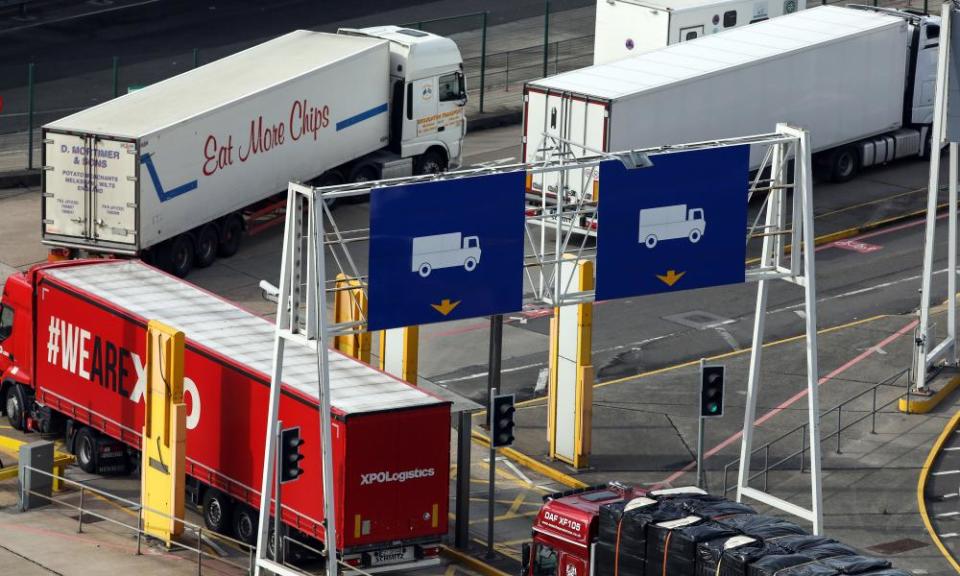Labour shouldn’t fall out over Brexit: it ought to focus on what happens next

Lord Mandelson is a former EU Commissioner, Labour MP and cabinet minister. He is currently is president of the Policy Network, and chairman of Global Counsel
Labour’s decision on how to vote on a Brexit trade deal with the EU (and we must assume that not even this ideologically fixated prime minister would put a few trawlers-full of British fish before the interests of the entire UK economy) looks set to reopen old arguments and old wounds. It shouldn’t. What is at stake for the party is not big enough to warrant a fresh Brexit disagreement – whereas what is riding on a deal, however limited, and where the country goes next, are huge.
In determining that Great Britain (Northern Ireland is in a different category) should not only leave the EU but additionally languish outside Europe’s giant single market and its frictionless customs union, Boris Johnson is putting Britain at a massive and permanent disadvantage in relation to its biggest export market. All the new benefits from every global trade deal we could ever aspire to will not begin to equal the size of our present European trade. This is the price we will pay for the triumph of hardline Tory Brexiters over those with a stronger sense of national interest in their party. It is also the price the rest of us in the pro-EU camp will pay for trying, in the years following 2016, to reverse the referendum decision rather than achieve the least damaging form of Brexit.
As someone who was firmly in the reversal camp, I played my part in this outcome. Yet if I could turn the clock back, I have little doubt I would do the same again. In such a narrow referendum result, and on an issue of such fundamental national importance, holding a second referendum on the terms of our Brexit departure, with all the hard facts available, was right to campaign for.
But while People’s Vote campaigners came down in favour of passing Theresa May’s outline deal and attaching a referendum to it, we did so too late, without much enthusiasm, and having spent all the time leading up to that moment arguing against her deal. We damned it as a half-in, half-out muddle but said the Commons should pass the deal so that the public could have the chance to reject it and stay in the EU.
Not surprisingly, both the Tory cabinet and Jeremy Corbyn hated this idea because they both wanted to accept the 2016 referendum result and because each party would have been divided in a further referendum: in the case of the Tories, split asunder; and in Labour’s, the leadership cut adrift from the party’s progressive base.
So the die was cast. Instead of May’s customs union-based compromise, the parties chose first deadlock then the Liberal Democrats, SNP and Corbyn opted for an early election to decide the matter. The rest is history and has brought us to the point of a very hard Brexit, mitigated only by a barebones deal that will help us over tariffs but keep all the customs and other frictions that will impede Britain’s trade and supply chains.
It is a sorry outcome but an inevitable one given the politically impoverished state of both main parties at the time and the inability of the People’s Vote campaign to gain sufficient traction in the country.
But while Labour can move on from Brexit, we cannot put Britain’s future relationship with Europe behind us. The party’s task now is to do everything possible to stop the country entering a period of national decline. The UK, having spent nearly half a century reshaping itself round the opportunities offered by European economic integration, has to scope out the next chapter in its national story.
Government and the private sector need to identify where the best potential exists to capitalise on our excellent science, research and technology base. Remaining open to the global economy is another condition for success. This needs to start in our home market, which I define as the UK and Europe. A future Labour government will need to rebuild our economic links to the EU so as to claw back the market opportunities and free flow of goods, services and capital that we are going to lose as a result of the Johnson Brexit deal.
And we must maintain the union (albeit within a new political settlement that offers fresh reason for the UK’s nations to remain bound together); and rebalance investment, economic activity and social opportunity in England from south to north.
There are many more ingredients to a 21st-century plan for Britain, including a recasting of work and the rights that go with it, and a modern welfare system to support it. The point, though, is this: instead of fretting about how best to sign off on Johnson’s miserable deal, Labour should focus on how it can bring a sense of vision and purpose to where the country goes next, and for what it would do for people and their families when in government.
This is a much better subject for Labour to start thinking through than falling out over the sorry end of this stage of the Brexit saga.
• Lord Mandelson is a former EU commissioner, Labour MP and cabinet minister. He is currently president of the Policy Network, and chairman of Global Counsel

 Yahoo News
Yahoo News 